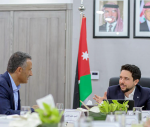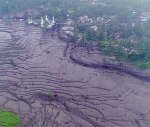You are here
A united home front
Feb 09,2015 - Last updated at Feb 09,2015
In an attempt to scare Jordan and perhaps other Arab countries that joined the American-led coalition in the battle against the so-called Islamic State (IS), the latter released a video last Tuesday of the burning to death of the captured Jordanian pilot Muath Kasasbeh.
Stunned by the brutality of the terrorists, Jordanians called on the regime to take immediate revenge. The following morning, Jordan executed Sajida Rishawi, convicted of being involved in terrorist attacks on three Jordanian hotels in 2005, and Ziad Karbouli, a top lieutenant of Al Qaeda in Iraq.
Additionally, Jordan stepped up its air strikes against IS on Thursday, in retaliation for the immolation of Kasasbeh.
If anything, the release of the video had the opposite effect. First, it raised fresh alarm over IS’ ruthless tactics. And, far from being scared, Jordanians demonstrated a high sense of unity and patriotism.
Indeed, IS failed to drive a wedge between the government and the people, or among people themselves, over Jordan’s participation in the international coalition against IS.
The public opinion in Jordan shifted dramatically after the killing of the captured pilot, especially once King Abdullah cut short his visit to the United States and returned home to lead Jordan in a critical movement.
Prior to the immolation of Kasasbeh, Jordanians had been divided with regard to fighting IS.
One group argued that the defeat of IS in Syria and Iraq was in the interest of Jordan’s security.
Proponents of this opinion made the case that it was a preemptive war and that it would be far less costly to fight the terrorists in Iraq and Syria than to deal with them on the country’s borders.
On the other hand, there were groups who argued that it was “not our war”. They said that Jordan should not be part of a coalition because IS did not threaten Jordan.
The running theme in their opposition was that the US did not want to put boots on the ground and that it was looking to drag Jordan and other Arab states to fight a proxy war for Washington.
Some insisted that Jordan was blackmailed into war by the US.
These groups failed to back their arguments with any hard evidence. Indeed, they, especially the Muslim Brotherhood, were exploiting the issue in the hope to fix their decreasing popularity.
After the release of the video, it is hard to see Jordan pulling out of the coalition.
Explicit in official statements is that Jordan will fight until the final victory over IS.
Indeed, the killing of Kasasbeh in an unprecedentedly cruel way united Jordanians behind the King. Hence, the government can now appeal to Jordanians’ sense of patriotism to step up the air strikes against IS.
It should be pointed out that the militants’ ideas are not new; they did not invent them recently.
These ideas date back to more than 1,000 years. As such, one should look at the conditions that helped extremists make these ideas relevant anew.
Obviously, their ability to recruit militants should be seen against the backdrop of the deteriorating socio-economic conditions. Therefore, addressing the socio-economic dimension of extremism is a must.
While Jordan is most likely to continue its war on militants, it is necessary to think thoroughly about the internal scene and how to deprive militants of sympathy inside Jordan.
It is no longer a secret that some disgruntled poor and unemployed youth sympathise with militants. Hence, it is the duty of the government to create the necessary conditions in the countryside for proper and sustainable development.
Short of doing that, it will be hard to integrate the poor and unemployed youth into the wider society.
Voices in Jordan increasingly demand that the government turn inwards and focus on education to instill the values of dialogue and tolerance.
The battle against militants is not only a military one; it is rather one on ideas, minds and values.
Therefore, it will be way less difficult for the country to grapple with the militants if it refocuses its attention on sound education.
On more than one occasion, the King made it perfectly clear that education and improving the socio-economic conditions of Jordanians as a whole was a national priority.
Fortunately, a quick look at what Jordanians posts on social media reveals that the society is ready for a change.
It remains to be seen if the government will seize the moment and introduce the long-awaited measures that underscore the culture of tolerance and inclusion.












